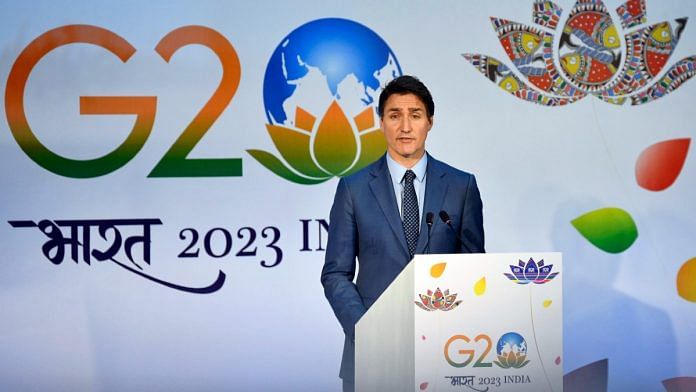India inaugurated the Indo-Pacific Army Chiefs Conclave in New Delhi Tuesday, with 15 army chiefs and delegations from 22 countries, including the deputy commander of the Canadian army, Major Gen Peter Scott, in full public attendance.
Despite the bitterness over the killing of Canada’s pro-Khalistan Sikh leader Hardeep Singh Nijjar, both Delhi and Ottawa are seeking to compartmentalise the growing row. The two countries are encouraged by friends and allies who don’t want to jeopardise Delhi’s growing involvement in the so-called “containment” of China.
“We’re very happy to be here and it’s very gracious for India to be hosting… I am fully aware of Prime Minister Justin Trudeau’s statement. The government’s stance and the government request for India to participate in, and cooperate in the investigation. But, really, that has no impact on us here at the Indo-Pacific conference. We’re really here to build relationships from army to army, and we’ll let our governments deal with that issue themselves,” Gen Scott said at the conference.
Also read: Canada must fix cosy approach to terrorism before accusing India. It’s terrible diplomacy
Piping down Trudeau
Indian officials must have smiled with glee to themselves. Trudeau was obviously trying to turn a killing into a political assassination when he accused India of having a hand in it in the hope that he would be able to leverage the hugely influential domestic Sikh vote in his favour. (The largest number of expatriate Sikhs live in Canada, about 2 per cent of its 3.8 crore population). Big Brother America would have surely told him to pipe down with his accusations a bit.
Over the past week, the Americans seem to have played a crucial balancing role in trying to resolve the crisis. On the one hand, the United States is believed to have provided intelligence to the Canadians regarding the involvement of Indian officials in Nijjar’s killing. On the other, the US seems to be leading the charge in keeping tensions down so as to keep encouraging India to enthusiastically join the effort to contain China.
Significantly, the Western press has noted that beyond the initial perfunctory statements, Canada’s major allies have hardly rushed to Ottawa’s aid.
“In the public eye at least, Mr Trudeau has appeared to be left largely on his own as he goes toe-to-toe with India, one of the world’s fastest-growing economies, with a population 35 times bigger than Canada’s,” said a BBC report.
It helps that India has loosened its defence purse strings and has bought $20 billion worth of arms from America since 2008. Notably, India has taken a leaf out of China’s book in both romancing the West as well as shunning it.
Also read: Canada blinded by its absolutist human rights values. Sikh hardliners will bite it back
Trudeau’s week that went by
There is, of course, Trudeau’s narcissistic behaviour that turns off the ardour of even the most adoring public. When he was elected prime minister 8 years ago, his popularity ratings were really high — today, 63 per cent of Canadians disapprove of their PM.
Clearly, he hasn’t learnt much, even in the last week.
After standing up in his parliament and alleging the involvement of Indian agents in killing Nijjar, Trudeau ended the week by acknowledging his speaker’s misdemeanour in praising a Ukrainian man who had served in a Nazi SS unit during World War II.
Trudeau’s own ministers are trying to find a way out. Defence minister Bill Blair told CBC that it was time to move to a criminal investigation of how — and presumably why — Nijjar was killed. The question no one asked is: Why hasn’t it been done yet? And did Trudeau jump the gun by going public with his Indian accusation?
Canadian officials say that their Indian counterparts do not deny the accusations in private. This begs the question, even if the private exchange were true, as to what pressure Trudeau was under that openly accused the Narendra Modi government.
India’s winning the match
For the moment, India seems to have won the perception war. By attaching the properties of pro-Khalistan Canadian leaders back in Punjab, stopping all visa services for Canadian nationals, and expelling a senior Canadian diplomat, the Modi government is sending a message: It takes its reputation seriously and won’t accept any allegations from any government, including those in the powerful West.
It allowed External Affairs Minister S Jaishankar to easily say in New York, where he addressed the United Nations General Assembly, that it is still a “world of double standards” with influential nations resisting the “pressure to change”. Though he made the statement citing the example of Covid-19, it isn’t tough to miss the broader implication of the remark.
Jaishankar knows all this like the back of his hand — he has been a top diplomat for 40-odd years, not for nothing. The Canada crisis isn’t over yet, but it’s clear so far that the Modi government, while batting on a weak wicket, is now winning the match.
Jyoti Malhotra is a senior consulting editor at ThePrint. She tweets @jomalhotra. Views are personal.
(Edited by Humra Laeeq)



